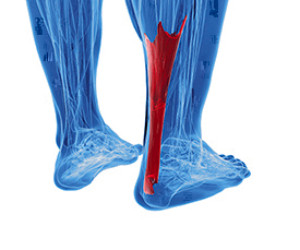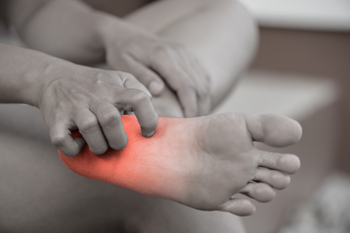Items filtered by date: December 2022
Ways to Handle Achilles Tendon Injuries in Runners

Injuries to the Achilles tendon are some of the most common problems among runners. The Achilles tendon, medically known as the calcaneal tendon, is located at the back of the heel. It is the strongest tendon in the body, connecting the heel bone to the muscles in the calf. When the Achilles tendon is torn or ruptured, it can be extremely painful and inhibit daily activities. In some cases, the Achilles tendon becomes inflamed, thought to be caused by overuse. This will result in tenderness to the touch, as well as pain when first waking up. Also, the calf, ankle and heel will feel stiff. Many times, after engaging in a run, the tendon pain subsides for a while, but increases again later. Stretching the tendon further may actually increase the problem, experts contend, by hardening and shortening the calf muscles. Instead, taking a break from running and beginning a course of strengthening exercises is recommended. It is a good idea for anyone with Achilles tendon problems to consult a podiatrist for an examination, a diagnosis, and suggested treatment options.
Achilles tendon injuries need immediate attention to avoid future complications. If you have any concerns, contact one of our podiatrists of Summit Podiatry. Our doctors can provide the care you need to keep you pain-free and on your feet.
What Is the Achilles Tendon?
The Achilles tendon is a tendon that connects the lower leg muscles and calf to the heel of the foot. It is the strongest tendon in the human body and is essential for making movement possible. Because this tendon is such an integral part of the body, any injuries to it can create immense difficulties and should immediately be presented to a doctor.
What Are the Symptoms of an Achilles Tendon Injury?
There are various types of injuries that can affect the Achilles tendon. The two most common injuries are Achilles tendinitis and ruptures of the tendon.
Achilles Tendinitis Symptoms
- Inflammation
- Dull to severe pain
- Increased blood flow to the tendon
- Thickening of the tendon
Rupture Symptoms
- Extreme pain and swelling in the foot
- Total immobility
Treatment and Prevention
Achilles tendon injuries are diagnosed by a thorough physical evaluation, which can include an MRI. Treatment involves rest, physical therapy, and in some cases, surgery. However, various preventative measures can be taken to avoid these injuries, such as:
- Thorough stretching of the tendon before and after exercise
- Strengthening exercises like calf raises, squats, leg curls, leg extensions, leg raises, lunges, and leg presses
If you have any questions please feel free to contact one of our offices located in Wilmington, Whiteville, and Wallace, NC . We offer the newest diagnostic tools and technology to treat your foot and ankle needs.
Three Groups of Nerves

Damaged nerves in the feet may cause a condition that is called neuropathy. The network of nerves that are found outside the central nervous system are referred to as the peripheral nervous system, and are separated into three categories. Pain and touch are controlled by the sensory nerves, and natural functions consisting of blood pressure and bladder control are grouped into the autonomic nerves. The motor nerves are responsible for controlling muscle movement, and approximately 10 percent of the population in the United Kingdom is affected by neuropathy. Common symptoms that people can experience include a loss of balance, weakened feet, and there may be a numbing, or burning sensation in the hands and feet. People who are diabetic may be susceptible to developing neuropathy, as a result of elevated blood sugar levels. Additionally, a nerve injury may cause this condition, or it may occur from taking specific medications. If you have any of the above symptoms, it is suggested that you seek the counsel of a podiatrist who can guide you toward the right treatment solutions.
Neuropathy
Neuropathy can be a potentially serious condition, especially if it is left undiagnosed. If you have any concerns that you may be experiencing nerve loss in your feet, consult with one of our podiatrists from Summit Podiatry. Our doctors will assess your condition and provide you with quality foot and ankle treatment for neuropathy.
What Is Neuropathy?
Neuropathy is a condition that leads to damage to the nerves in the body. Peripheral neuropathy, or neuropathy that affects your peripheral nervous system, usually occurs in the feet. Neuropathy can be triggered by a number of different causes. Such causes include diabetes, infections, cancers, disorders, and toxic substances.
Symptoms of Neuropathy Include:
- Numbness
- Sensation loss
- Prickling and tingling sensations
- Throbbing, freezing, burning pains
- Muscle weakness
Those with diabetes are at serious risk due to being unable to feel an ulcer on their feet. Diabetics usually also suffer from poor blood circulation. This can lead to the wound not healing, infections occurring, and the limb may have to be amputated.
Treatment
To treat neuropathy in the foot, podiatrists will first diagnose the cause of the neuropathy. Figuring out the underlying cause of the neuropathy will allow the podiatrist to prescribe the best treatment, whether it be caused by diabetes, toxic substance exposure, infection, etc. If the nerve has not died, then it’s possible that sensation may be able to return to the foot.
Pain medication may be issued for pain. Electrical nerve stimulation can be used to stimulate nerves. If the neuropathy is caused from pressure on the nerves, then surgery may be necessary.
If you have any questions, please feel free to contact one of our offices located in Wilmington, Whiteville, and Wallace, NC . We offer the newest diagnostic and treatment technologies for all your foot care needs.
Foot Conditions and Obesity

Research has shown that approximately a third of the United States population is considered to be obese. This can have an enormous impact on the feet and may cause many foot problems to develop. Heel pain is a common ailment among people who are overweight, which is a result of the additional weight the heels must endure. Also, the heel may flatten from the same reason, which can change the entire foot structure. Losing weight may help to resolve some of these foot conditions, which may be challenging because of the lack of exercise that can be performed. Patients who are determined to lose weight may find additional ways to become active without exercising. These include taking the stairs instead of the elevator, pacing while on the phone, and walking by starting off with short distances. Many people choose to wear insoles in their shoes, and this may provide additional cushioning while standing. If you have foot conditions that have developed as a result of being overweight, please confer with a podiatrist who can effectively treat foot ailments.
Obesity has become very problematic at this point in time and can have extremely negative effects on the feet. If you’re an obese individual and are concerned about your feet, contact one of our podiatrists from Summit Podiatry. Our doctors can provide the care you need to keep you pain-free and on your feet.
Obesity and Your Feet
Since your feet are what support your entire weight when standing, any additional weight can result in pain and swelling. Being overweight is one of the main contributors to foot complications.
Problems & Complications
Extra Weight – Even putting on just a few extra pounds could create serious complications for your feet. As your weight increases, your balance and body will shift, creating new stresses on your feet. This uneven weight distribution can cause pain, even while doing the simplest tasks, such as walking.
Diabetes – People who are overweight are at serious risk of developing type-2 diabetes, which has a drastic impact on the health of your feet. As you get older, your diabetes might worsen, which could lead to loss of feeling in your feet, sores, and bruises. You could also become more prone to various infections.
Plantar fasciitis – Pressure and stress that is placed on muscles, joints, and tendons can trigger plantar fasciitis, which is an inflammation of tissue that forms along the bottom of the foot.
If you have any questions please feel free to contact one of our offices located in Wilmington, Whiteville, and Wallace, NC . We offer the newest diagnostic and treatment technologies for all your foot and ankle needs.
Various Types of Running Shoes for Different Running Needs

There are several different types of running shoes, and it can be a daunting task to choose which kind is right for you. It is important to identify the running preferences in addition to the type of surfaces that will be run on, such as trails or pavement. Trail shoes are known to provide traction in the snow and mud, and can help to protect the feet against rocks and rugged terrain. Additionally, trail shoes are sturdier, which can successfully support the foot as it moves from side to side. Conversely, road shoes are ideal for running on treadmills and smooth pavements. People who compete in track meets often opt for track spikes or racing flats. These shoes are helpful in gripping the surface in various types of weather, and are considered to be the lightest running shoe. If you have questions about what type of running shoes are best for you, please consult with a podiatrist who can address any concerns you may have.
You should always make sure your running shoes fit properly in order to avoid injury. For more information, contact one of our podiatrists from Summit Podiatry. Our doctors can provide the care you need to keep you pain-free and on your feet.
Choosing the Right Running Shoe for Your Foot Type
Improper shoe sizing can cause a myriad of problems for your feet. Shoes that don’t fit you properly can lead to muscular imbalances in your body, which can result in foot, knee, and hip injuries.
Tips for Finding the Right Running Shoe
- Make sure you have a thumb’s width of wiggle room between the end of your longest toe and the front of the shoe.
- There should be little to no slipping at the heel
- Don’t assume your size in one shoe brand will be your size in another
- Do not lace up your shoes too tightly
- Walk around in the store with your new shoes before you buy them
If you have any questions please feel free to contact our one of our offices located in Wilmington, Whiteville, and Wallace, NC . We offer the newest diagnostic and treatment technologies for all your foot and ankle needs.

